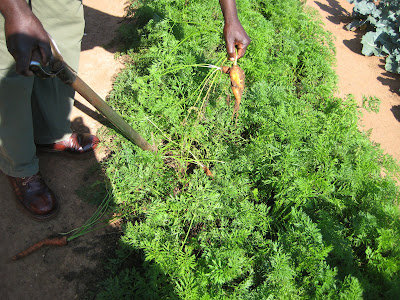

Jun.11
The hospital has several wards for inpatients, including the male and female wards, pediatrics, TB wards and maternity wards (with a delivery room called the “labor suite”:). The operating room is called the “operating theater”. It also has several departments including OPD (Out patient department), labs, pharmacy and a chaplain.
Tuesdays and Fridays are the days for surgery. Today Dr. Yomo, an orthopedics surgeon from Lusaka, was here to do some operations. There is no orthopedics surgeon in this hospital, so they accumulate orthopedics cases to wait for him to come do procedures every two or three months. The first case I saw today was a partial hip replacement. The patient’s femur head was fractured so they had to replace a prosthetic femur head into the position. The whole procedure was quite traumatic and there was lots of drilling, cutting and pulling. I was surprised by how different the standard of sterilization is here. Except gloves, all the gowns, caps, clothes, and covers are reusable. The cloth covering the patient had stains on it. The scrub-in protocol is pretty standard however despite the lack of equipments. I asked about the post-surgery infection, and was told that it was not a significantly large amount. These patients are usually on heavy antibiotics post-operation for a long period. The next procedure I saw was plating a broken radius. The patient broke his radius and ulnar bones, however only radius was stabilized with a plate because there was no extra plate available for the ulnar. “Hopefully the ulnar will be straighten and grow back itself”, says Dr. Yomo. Another frequent thing Dr. Yomo said during his surgeries was “normally we would do this and that, but here we don’t have it, so we will do… instead” It was amazing to see some creative ways he used the instruments. When he was taking the fractured femur head out, he used a speculum to stabilize on one side and pop it out. In resource poor setting, you just have to make do from what you have.
I also saw a C-section today. Compared to the one C-section I saw back in the US which took about 2 hours, this one took about 10 min. There are two surgeries room. One is for “major surgery”, which requires full scrub in with surgical gowns and gloves. The other two rooms are for “minor procedures”, and all you do is put on the sterile gloves. This C-section was done in a “minor surgery room”. The patient was a skinny 16 year old, it literally took the surgeon Dr. Moon a minute to cut open the belly and expose the uterus. Another few minutes, he took the babe out. The newborn was delivered post-term and was compressed in the uterus and couldn’t get out for the past two days. There was no warmers or any fancy cleaning equipments we use in the US. The newborn was patted in the back to let it cough out the mucus, and wrapped in a towel. A nurse uses rubber bulb to suck out the mucus in the babe’s throat and nose. When the babe started to cry and get less blue, it was putting to the side of the mother. The entire procedure took 10 minutes. I still couldn’t believe that.
Besides the hospital, a few days in Macha, I have been quickly introduced into the social circle of students and researchers around the campus. There are quite a few medical students and researchers from Holland, as well as a few Americans. Tonight, I went to a Dutch family’s house for a movie night. The husband manages the properties in the institute, and the wife is a doctor at the hospital. They have a 6 year old girl. When we came in, the little girl was playing puzzle with a Zambia girl. They have a projector to play the movie on the wall. It was pretty nice. The movie we watched was called “the cider house rules". It is about this boy growing up in an orphanage in Maine. The doctor in the orphanage wanted to make him his successor and trained him to be a good Ob/gyn doc (the orphanage also does abortion for women). However, the boy didn't want to become a doctor like him, rather, he was eager about the outside world. So he left, and worked in a apple farm, there was a lot of things happened, he fell in love with a beautiful woman whose fiancée was at the WWII and was also his friend (similar to the love twist in “Pearl Harbor”), he had to do an abortion procedure for the girl in the farm who was raped by his father,and many other things, eventually he went back to the orphanage to take place of the doctor, who overdosed himself with alcohol before the boy returned. It was an interesting movie with some mixed message, but it's interesting nonetheless.
When we walked back from the movie night today, it was pitch dark and really serene. Everyone here walks with a flashlight at night. It is so dark in the surroundings that you really can not see anything when there is no light - just too few photons I guess. But the stars are really big and bright. It’s mesmerizing to watch them. They are also sorts of in 3 dimensions, you can tell which star is closer and which farther away. And it’s even more amazing to watch when they are half covered by cloud. It makes you feel that they are really close to you.





















